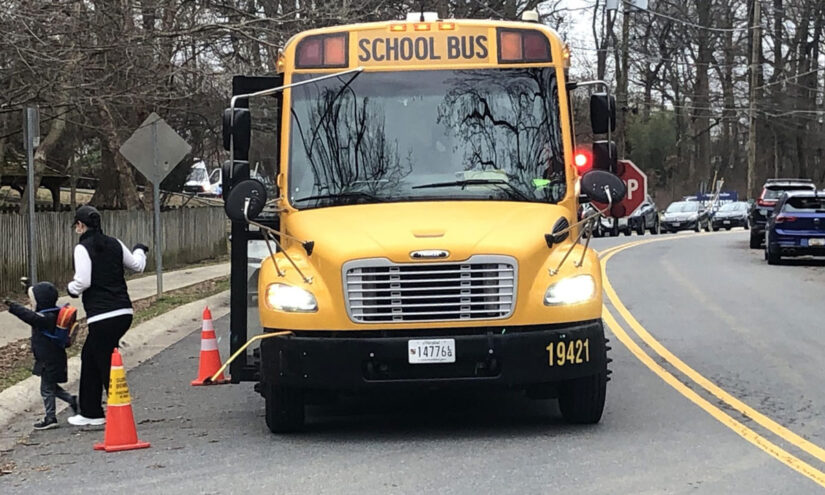An updated study on child well-being nationwide reveals a decline in IndianaR …
Drivers Continue to Illegally Pass Stopped School Buses Despite Camera Surveillance
Jennifer Livingstone

In Long Island, New York, last December, a mother witnessed her child boarding a school bus and had to swiftly dodge a car speeding past on the shoulder, as captured in this video. Similarly, in Minnesota the same month, a child narrowly avoided being hit by a pickup truck as he exited his school bus, as seen in this footage.
Despite efforts to enforce laws aimed at deterring drivers from illegally passing stopped school buses, reports of dangerous incidents persist across the nation, posing threats to children and adults alike. Several states have encountered challenges in implementing legislation allowing the use of on-board bus camera systems to capture and document these violations.
Tragic incidents involving fatalities during school bus stops, such as those of a parent and a student in separate incidents in Texas last year, and a high school student in Pennsylvania in 2022, underscore the urgent need to address reckless behavior despite visible stop signs and surveillance cameras. The rise in aggressive driving patterns noted by authorities amid reduced overall driving volumes since the onset of the COVID-19 pandemic adds to the concerns.
An annual survey conducted by the National Association of State Directors of Pupil Transportation Services revealed a troubling estimate of 242,000 vehicles illegally passing school buses in a single day, a noticeable increase from the previous estimate of 232,000 in 2019. In response, seven states enacted laws allowing the use of automatic camera surveillance systems to identify and penalize suspected violators.
With nearly half of the states now equipped with such laws, states like Massachusetts and Oregon considered similar legislation in the past year. However, challenges remain in implementation, as seen in debates surrounding a school bus camera program in Bridgeport, Connecticut, where concerns over fines’ impact on low-income communities stalled progress.
Enforcement issues arise due to varying interpretations of new camera laws that may lessen penalties and exclude punitive actions sanctioned when violations are witnessed firsthand by law enforcement officers. Additionally, challenges in applying the laws arise from technical limitations of camera systems in capturing essential details as required by state laws, undermining the efficacy of enforcement efforts.
The Enforcement Process
When a school bus driver activates the flashing stop sign, automatic cameras are triggered to detect violations, which are then reviewed for accuracy before issuing violation notices. However, shortcomings in camera evidence have led to legal challenges, as seen in New York’s Long Island court decision to dismiss a ticket due to insufficient evidence to prove the violation.
Judges raised concerns about the adequacy of camera evidence in establishing the bus’s legitimacy in picking up or dropping off passengers and adherence to markings, raising uncertainties about the future of fine revenue from county programs reliant on bus camera enforcement.
In Pittsburgh, a district court judge highlighted similar concerns over insufficient evidence from school bus cameras, leading to dismissals of cases and criticisms against laws that dilute penalties for passing stopped school buses when enforced through camera evidence compared to police eyewitness accounts.
State legislatures’ decisions to opt for lesser punitive fines without license points or suspensions as part of camera enforcement strategies have drawn mixed reactions from safety authorities, raising questions about the disincentive effect on repeat offenders and the overall efficacy of these measures.
Updates to Pennsylvania’s school bus camera law introduced easier avenues for motorists to contest tickets and emphasized reducing barriers to challenging violations, indicating ongoing efforts to refine and improve enforcement mechanisms.
A recent court ruling against red-light camera evidence in Long Island showcases the ongoing challenges in relying solely on camera technology for enforcing compliance with school bus safety laws, jeopardizing revenue streams and legal processes that hinge on camera evidence accuracy.
Local governments stress the importance of camera technology in protecting children and enforcing school bus safety laws, underscoring the crucial role of automated surveillance systems in deterring reckless driving practices.
Contractors like BusPatrol play a crucial role in deploying school bus camera systems, offering comprehensive solutions for automated traffic enforcement, with investments in technology aimed at enhancing evidence collection and accuracy.
Statistics on deaths and injuries from passing stopped school buses are limited, but the need for effective enforcement measures is evident, with incidents of fatal crashes prompting renewed calls for stricter adherence to school bus safety laws.
In Minnesota, where school districts can secure state funding for school bus cameras, initiatives to enhance safety measures have shown promising results by significantly reducing passing violations and enhancing enforcement efforts.
Efforts to address violations through camera evidence and legal action following tragic incidents, such as the fatality in Upshur County, Texas, underscore the importance of robust enforcement mechanisms to safeguard school bus passengers.
Texas’s proactive approach to studying and implementing camera technology in curbing school bus passing violations serves as a model for other states, with notable successes in cities like Austin, Dallas, and San Antonio in leveraging this technology.


